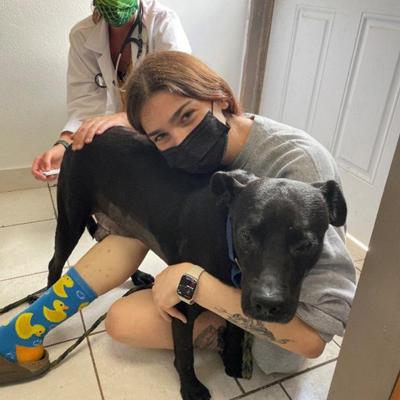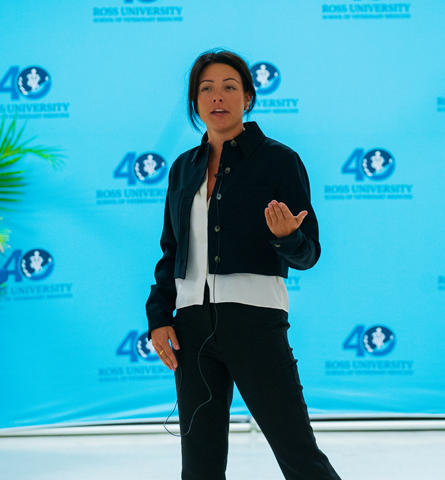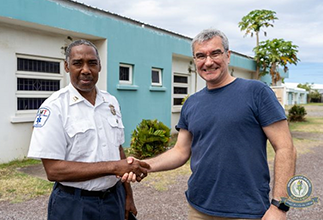At Ross University School of Veterinary Medicine (Ross Vet), an important component of the hands-on experience offered to students is the opportunity to work with campus teaching dogs throughout the Doctor of Veterinary Medicine (DVM) curriculum. Beginning with dog walking and lab courses in the first semester through various weekly rotations in the seventh semester, teaching dogs have become critical in helping Rossies grow and hone their veterinary skills. When Elisa Santo, Class of ’23, returns to the United States to start her clinical year, she will be bringing a special part of Ross Vet’s campus with her.
Santo first met Shadow, a teaching dog, about one year ago when she was volunteering at the campus kennels. For Santo, Shadow’s entry into her life came when she needed him most. “I believe that most things happen for a reason, and Shadow coming into my life when he did just supports that idea,” recalled Santo. “The final semester on island is especially challenging, it brings on a whole bunch of change and uncertainty that I was not prepared to be so anxious about. When Shadow came into my life he brought with him a sense of comfort and calm, a feeling that has been missing this semester. He allowed me to focus on the present and helped lower my stress about the uncertainties.”
Throughout her childhood growing up in New Jersey through the present day, Santo counts over one dozen shelter dogs she and her family have adopted. Her mother also worked as a dog trainer, so being around dogs and supporting their needs has always been part of Santo’s life. The family dogs became her very own “pack” at home, but it was not until she was about 18 years old that she first was inspired to think about a career in veterinary medicine. “My mom’s border collie had to have an extreme invasive foreign body surgery to remove an ingested bone piece from his esophagus, and I remember that feeling of being helpless and not knowing what is going on,” Santo recalled. From then on, she was determined to never feel that helplessness again and set out to be just like the veterinarian that saved their dog’s life. She volunteered as a kennel technician and worked her way up to a surgical technician role while she was going to school at Ramapo College of New Jersey.
RUSVM PRE-CLINICAL CURRICULUM
Fast forward to today, and the next stop on Santo’s veterinary journey will be the University of Florida for clinical rotations. Before any Rossie leaves St. Kitts to complete their clinical year, they go through a series of on-campus rotations that conclude the pre-clinical curriculum. The shelter medicine rotations have become some of the most popular among upper semester students, and it was one Santo most looked forward to with her background fostering and adopting dogs paired with her future aspirations to specialize in shelter medicine. About halfway through Santo’s week completing her Primary Care Out Of Hours (PCOOH) rotation at the Ross University Veterinary Clinic (RUVC), Shadow was brought in.
Shadow was diagnosed with prostatitis that further developed into a prostatic abscess, and results from his blood work, urine discoloration, and tick-borne and prostate infections forced him to go to RUVC’s Intensive Care Unit. He felt so ill that he could not even sniff a piece of food or treat. In the ICU, he had an invasive surgery to clean out all his infections and was put on IV antibiotics. The surgery and intensive care were led by Drs. Ryan Cavanaugh, Andrea Peda, Harut Avsaroglu, and Susan Pothecary, and Santo provided around-the-clock support to Shadow and the entire team involved in bringing him back to good health.
“When we are doing rotations, we are there all day and on call at night. We were down one person on the schedule when Shadow was first brought in, so right away I volunteered for any extra shifts I could just to be with him while he was treated and recovering,” said Santo. “After his surgery, I was working with Dr. Peda, and she brought up the idea for Shadow to be able to recover comfortably in a house and I thought to myself I am really great at fostering. I took him home and it was about 10 days until we had to get his incision staples removed. It was one of the biggest incisions I have ever seen. Once those were removed, it took about another month before he was back to his normal, happy, bouncy self. Now he is full of energy all the time and so happy to be there with me.”
RUSVM TEACHING DOGS
Ross Vet’s teaching dogs typically last about six or seven semesters on campus before they are retired to be adopted into a forever home. Students work with them every step of their journey, from something as simple as walking the dogs all the way through lab courses and weekly rotations covering canine ophthalmology, orthopedics, theriogenology, primary care, physical examination, emergency medicine, and client communications. “It is extremely unique how Ross Vet sets us up to be with these dogs every step of our journey. In a way, it unites the student body because big parts of what we do as we move from semester to semester involves teaching dogs. Being part of the teaching dog colony gives them not only a consistent shelter, food, water, enrichment, training and eventually a forever family, but it also gives them a second chance at life. As students we are just as lucky if not more to be able to work and experience these charming dogs.” said Santo.
Though Shadow was not quite at the end of his time as a teaching dog, the team in charge of his care knew it was best for his long-term health to retire early. The decision was an easy one for all involved because a forever home was already part of the team, and he was already there recovering. In late June, the paperwork was signed for Santo to officially welcome Shadow to her family that already included Anya, another teaching dog Santo adopted in January 2022. The two now-former teaching dogs are inseparable at home.
“These dogs are either found on the street, surrendered by their owners, or do not have a loving home. The odds are stacked against them, and I love working with shelter dogs because they previously did not have someone by their side giving them a chance. My dogs that I have adopted going back to New Jersey have been the ones that were given up for behavioral or medical issues. When you give them an opportunity to thrive and live their best life, they give back to you a sense of gratefulness that you did something for them.”
With Shadow now part of the family, the biggest question on Santo’s mind is how a dog from St. Kitts making a one-year stop in Florida will adjust to seeing a New Jersey snow for the first time. From what we know about Santo and Shadow, we can expect his usual, energetic, happy, bouncy self.







